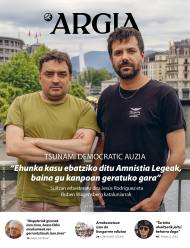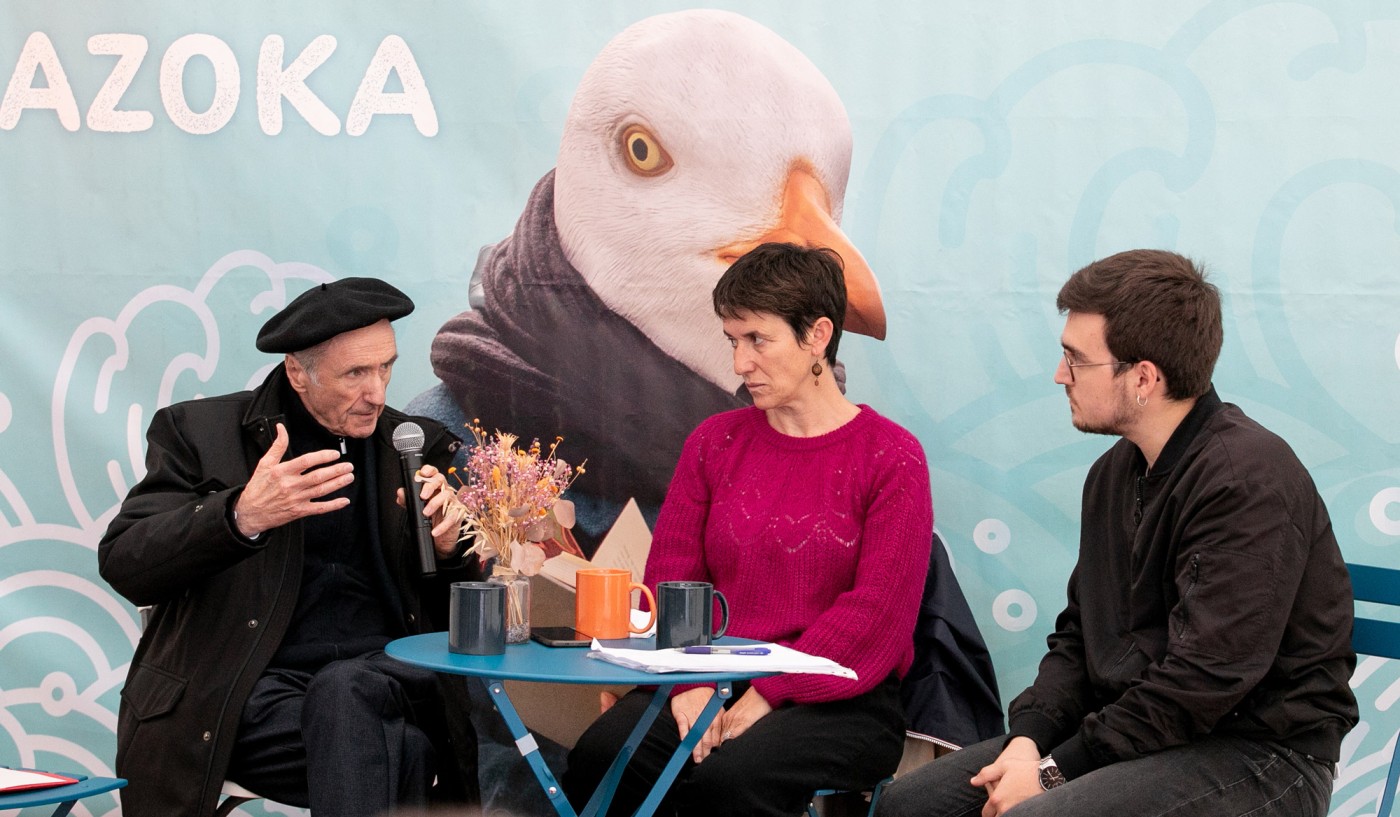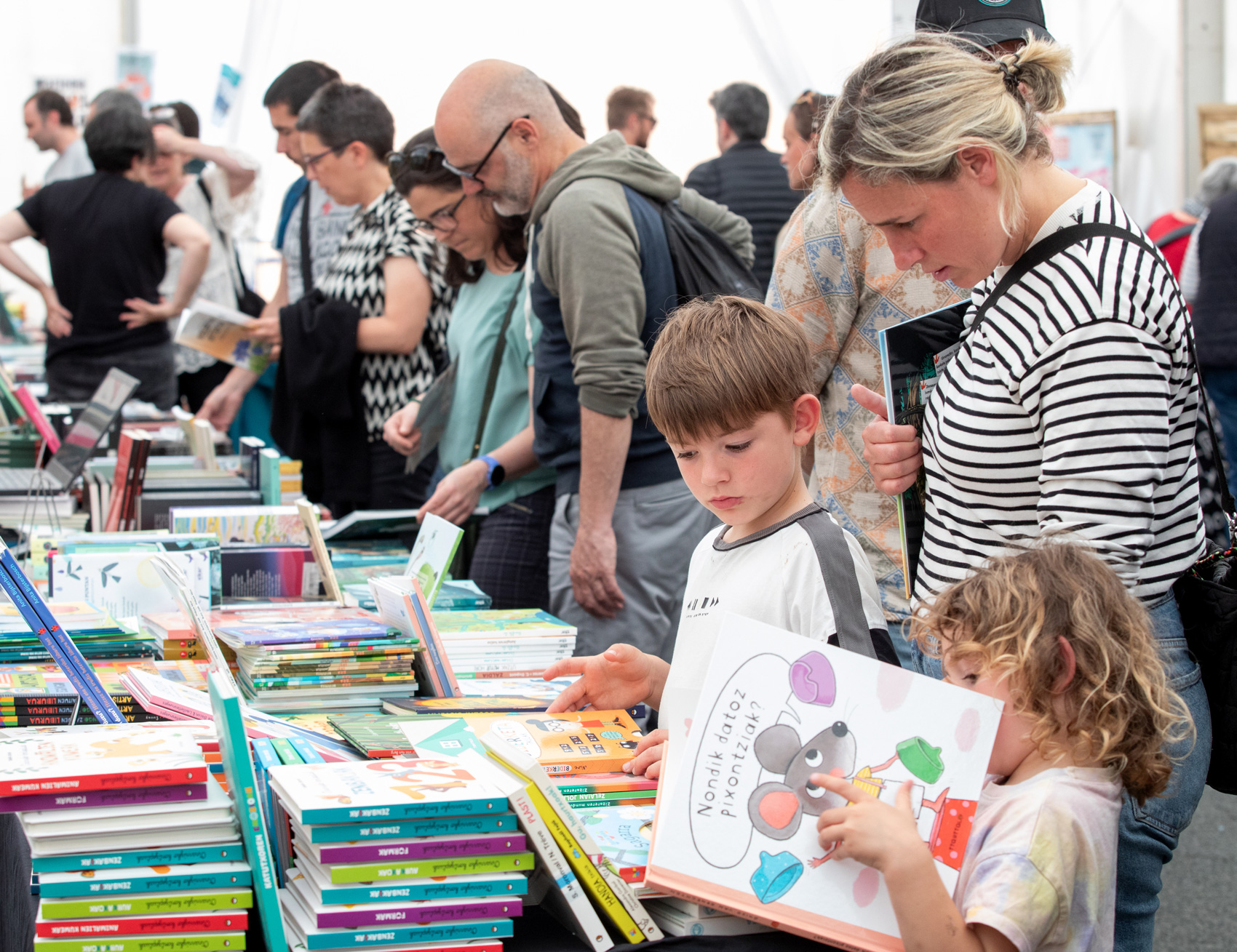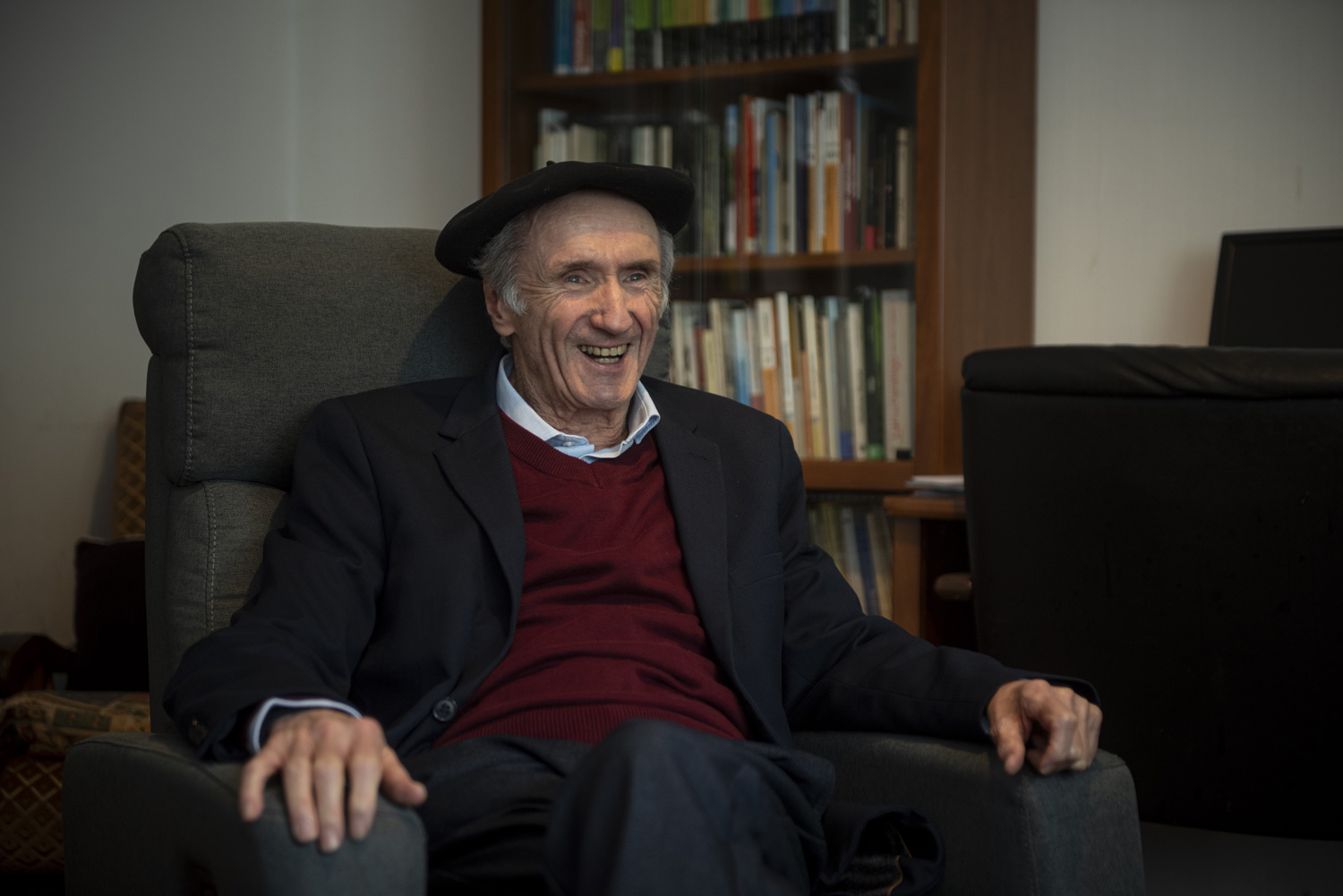I lost, the Basque and we are
- The Ziburu Basque Book and Records Fair has passed on June 1 with about 40 publishers and record companies and over a thousand visitors in the plaza. The organizers value this fifth edition positively, whose motto was Euskera or ezkara, and have thanked the presence of the people, the creation of a square entirely in Euskera and the confidence in the informal valuations they have denied with editorials and labels.

"We are consolidating ourselves in the agenda, we are becoming a quote," says one and the other, "we have become a quote." Members of the Baltsan association and the ARGIA media are at the informal moment of the valuation at the corner of the bars. At ten o'clock in the evening, dismantling the fairgrounds and dismantling the weight of the responsibilities above the shoulders, the fifth edition of the Book Fair and the Basque Disc of Ziburu has stumbled upon the gin-tonic that have become tradition, totally exhausted but very happy.
For market support once again: Zarautz, Elizondo, Ortzaize, Arrangoitze, Zornotza, Iruña, Sara, Baigorri, Zumaia, Baiona, Irun, Ozta... In Plaza de Ziburu, several of the corners of Euskal Herria have met, on the occasion of the celebration of a fair under the motto Euskara ala ezkara. The Basque or we are not the witnesses who try to live in Basque without an official in the middle of a French ocean that took place the day once and for all "the Basque and we are". Emphasizing the simplicity of the possibility of living one day only in Basque in Iparralde, “people feel grateful, have come to thank him”, Maddi Zubeldia, one of the organizers who warned him. According to the last sociolinguistic survey, 20.1% are Basque at the levels of Zuberoa, Baja Navarra and Lapurdi, which means that the percentage of people who use Euskera as much as French is 7.1%. In this context are the organizers of a plaza entirely in Basque, Baltsan and ARGIA. They've had their fifth edition on June 1, and over 1,000 visitors have responded to the gummy.
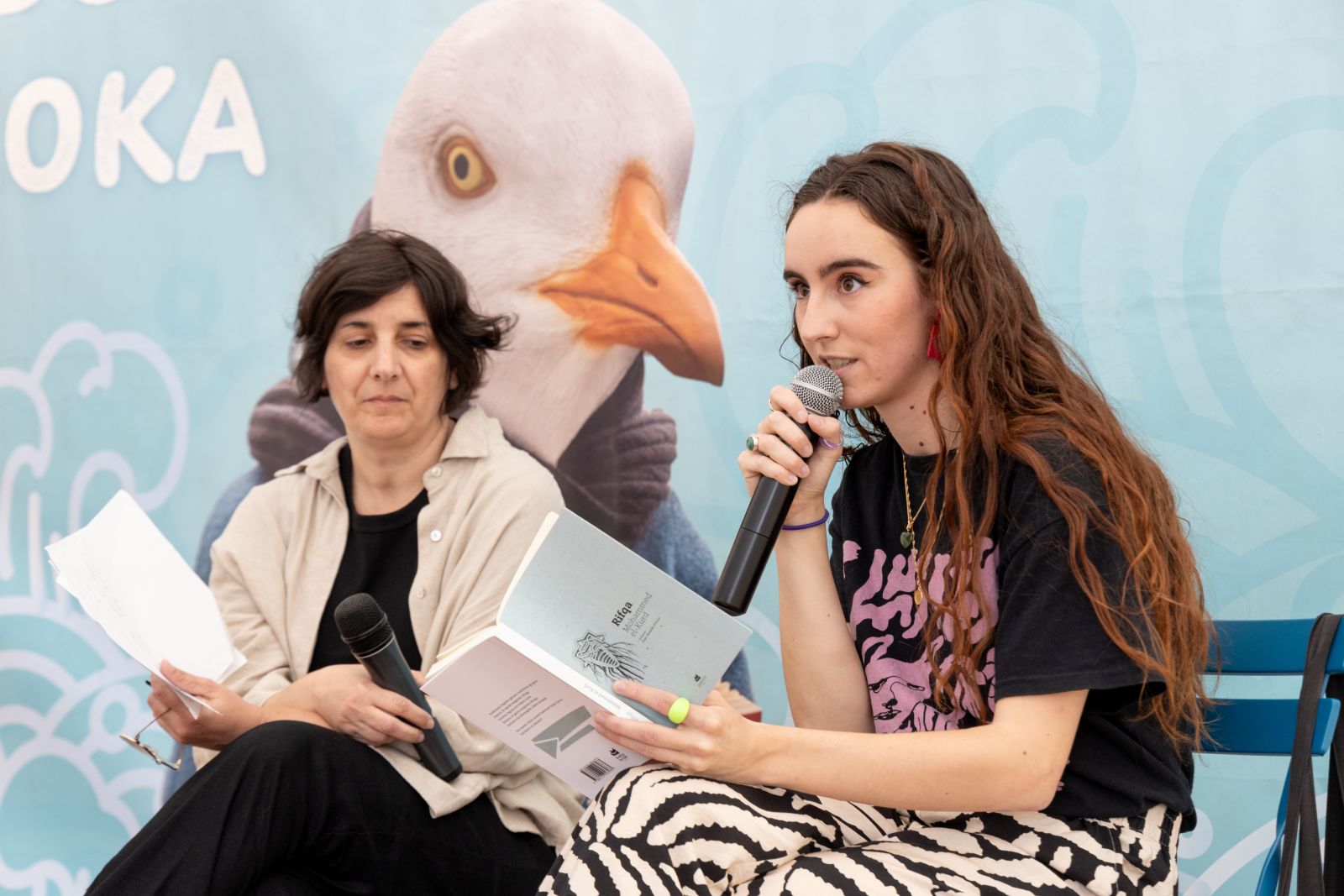
The day began by paying tribute to the culturist "humble, laborer, with a nice pen and a militant" Daniel Landart, emphasizing the "fruitful and rich harvest" he has dedicated for 60 years to Basque culture. In the act of tribute to the two Basque journalists of Baeñat, Juan de Monástegui and Juan de Garay, Juan de Garay, Juan de Garay, Secretary of the Academy of the Basque Language of the University of Buenos Aires, Juan de Garay and Juan de Garoya. The microphone in hand, in front of an attentive audience, was later dedicated to the theater with playwright Arantxa, journalist Gorka Peñagarikano.
.jpg)
“I work from home, social networks, computer behind... I prefer to be here. The fair is an air intake.”
Ekhi Lambert
The listener jumped from Landart's words to the rock songs of the Pelax group, collecting some of the songs from his recent album Esan gabe doa. Because Ziburu's quote is also a concert venue since last year. In order to offer more space to the discography, in the last edition the typical concerts were started in the middle of. Basically, like a presentation of books, once received live, the listener has under the tent the possibility of talking with the creator or buying a record. On this occasion, in addition to Pelax, the Paxkal Irigoien and Maia Iribarne basonavarro were able to enjoy an impressive pair of Bloños with food. Here too a world, poetic and attractive, grateful for the public, some certainly neglected in él.La performance ended up repeating aloud the "promise of respect for ourselves" of the song, and each continued in it, keeping this mantra in depth. Then, Alayn Carazo and Iosu Isaias Villanueva Isuo took the voice by adding to the sounds of the tarima, the synth and the guitar, sometimes slower, taking the audience away from repetitive sounds. The musical offer ended with the Lumi group, one of these places, in which the couple had friends and followers that helped to warm the environment. Or maybe it's an end-of-day group: getting ahead of the day, because the environment got heated, as the beer glasses were taking place at the morning coffee bowls or on the table.
Undeniable proof that the paper bags were housed next to the listener, who had turned around the fair. Because, despite being an abundant cultural program, the quote is based on that: It is a space that brings together about 40 publishers and record companies from Euskal Herria. This is to the fair extent, i.e. to the standard extent, so as to ensure the exchange between the creator and the receiver. This feature is important for Yolanda Arrieta who was presenting the book A House for Oneself. It appreciates, fundamentally, that the book was presented in a small tent outside the point of sale: "We need quiet spaces to collect the benefits and healthiness of art. (...) We have to take care of the space, to be together we need spaces for dialogue; the market is a meeting, a meeting between Basques and our relationship is verbal, and that relationship does not help the noise. Great initiatives are fine, but we need small ones, to focus the word on importance, also on the word and silence."
He added another important element in the presentation, an observation that manifests itself to the journalist when talking to the creators: "Creating isn't just creating a book, that's market." Creating, recognizing what's out there, giving another way to what's out there, is causing it, creating new questions and representing different answers -- that's all creativity according to Arrieta.
.jpg)
That's the essence of the writer and the musician, and that's what they're doing, although economically they don't have a long, fruitful, smooth path. He starts a conversation with musician Ekhi Lambert and soon finds his ghosts, questions, contradictions and doubts. After being at ease in the "euphoria of creation", now it's about the promotion and it doesn't have the most comfortable exercise: "This question of the image -- the tyranny of the image is not easy," "there's each one's ego dancing, and big companies proclaim it." But it has to go through, and it just made a bitter choice to be on social media. Along with his friends from the record companies Mukuru and Xofaldia, he has kept his table on the market. Thank the listener for the exchange space: "Working from home, from social networks, behind the computer... I'd rather channel my stuff from here. The fair can't change the world, but it's an alternative, it's an air intake."
Also, Bea Sallaberri, who has just taken the book Mesfimate, underlines the importance of this moment of being with the reader. It is also clear what it means to be a place of books exclusively published in Basque: "The great diversity we have in the midst of the Basque litarature is evident, and that is a lot because you give it the opportunity to be seen in Basque production. Think about how sometimes a book has been pulled out and you don't know, that's terribly for the writer." The world of Basque writers is concentrated in the Plaza de Ziburu, a great literary fame, new or old. There has been another year presenting the poetry book of Auxtin Zamora Hatsa: "Being here is a pleasure, it's an opportunity to get our ideas through. Even though we sell a good number of books, we spread a lot of words. But we have always said that poetry is not sold, that poetry is made."
The message also went to Paris, putting on stage the banner ‘Azterketa euskaraz’ and taking the photo
Maddi Sarasua has just taken the book of poetry with the editorial Mayo, making the leap to poetry through bertsolarismo.En Biharra's eyes have named the first book, a compilation of texts that has been accumulating for years: "I have always written many texts, many reflections and some have taken the form of poetry. Asked by my sister for songs, I pulled them out again and realized what I had. I was interested because they served to represent some experiences, reflections, attitudes and dreams". Despite its essence, the transition to a book has not been easy and thanks for the support of Luzien Etxezaharreta and Peru Iparragirre. The poem is also an interesting tool for the transmission of political ideas to Sarasua, also a member of the socialist movement. Overcome the most difficult step to turn into a book, he is enthusiastic about dissemination and, although he has nothing clear, it is possible that dissemination takes the form of readings or musical poetry.
.jpg)
The fair also aspires to be a mirror of gender diversity and its reflection is, for example, that in the presentations of books one is of each genre: poetry, novel, translation, comic book and essay. As for the comic book, both the editorials Harriet, Xabiroi and Herrima and the feminist collective Tupust have visited the Plaza de Ziburu. Despite the improvement of things and the growing harvest of the comic book in Basque Country, Ainara Azpiazu Axpi and Maite Caballero, from Tupust, believe that much remains to be achieved. From what they say, if you look at the place of the comic book in neighboring countries, you realize its small space in the Basque Country, and that serves to underline the cultural component: "The comic book is not considered a literary field"; "the comic book is seen as a very small field; as a medium with the capacity to count a thousand things it is not seen"; and in general, "we are not a society in which the visual culture is specially worked". That's why it's also important to be at the Ziburu Fair: to change views, prejudice and make the reader take a step further in the world of comics.
The fair had a non-editorial agent, among the editorial Hatsaren Poesia eta Zirinta: Yarn. Association created by Lacartesa Mirentxu Ibargarai, which has just set up a subscription system for the dissemination of children's and youth literature: each month it sends the subscriber a book in Euskera with audio of the story and a presentation document aimed at adults. Once again, it is a project that aims to provide the Basque Country with a new framework in the sociolinguistic reality of the Northern Basque Country: it wants the child to be a tool for parents who have in the ikastola or in the bilingual department, but not only because, in the end, being a book shop for Basque literature, it is responding to a more general demand. "The passion for reading among children is surprising. Children are always associated with illustrated albums. That is why it is important for Euskera to be in this area. Those who do not have Euskera as their mother tongue have to live these emotional moments in Euskera".Evidently, Ibargarai had a day to relate directly to publishers, and like him, basically, all others. That's what Xabi Salaberria, from the 1545 editorial that was there for the first time, likes: "I've been a spectator every year and I've been very comfortable, because this market has a special environment. This year we have taken part in the table, as it is a trade fair with a desire to participate. We're not really at many fairs, because we don't live from that, I'm a professor in myself. But we wanted to be in Ziburu."
“As it is a fair entirely in Basque, the great diversity of Basque literature is
evident” Bea Salaberri
And so the fair, with the storytellers, has passed from one table to another, with the guarantee that the cartoonists Mattin and Amane Apalategi and the bertsolaris Maddi Sarasua and Maddi Txosoperena have taken out of the tent a cultural initiative: book presentations, concerts, humorous monologues of Txiki, several children's workshops and boceps.
.jpg)
The message was also addressed to Paris, precisely because 1 June was the day of mobilisation to demand recognition of minority languages dependent on the French State. The tests were uploaded to the banner scene and a photo was taken. Politically, we also chose to focus our gaze on Palestine, opting to include in the book presentations the translation of the book Rifqa of the Palestinian Mohammed El-Kurd, published by Katakrak. That's why we danced Eider Behobide, a translator who read the poem and remembered the genocide directed at Gaza.
What place does the theater have in a showcase like the book and the Basque fair of Ziburu? Or in other words, how much does the theater of literature have? This question was the starting point for Daniel Landart and Arantxa Hirioien at the round table Zubiburu of the opening... [+]
Berrogei argitaletxe eta diskoetxe, horietarik bederatzi berri, eta 120 salmahai bosgarren Ziburuko liburu eta disko azokan. Ekainaren lehenean ospatuko dute Baltsan elkarteak eta Argia hedabideak









